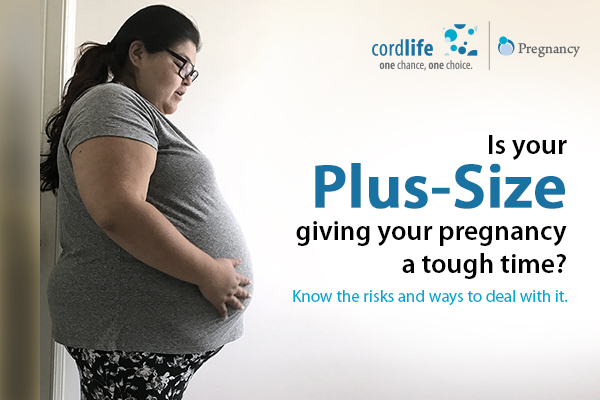Table of Contents
The nine months long journey is not rosy throughout. Every expecting mummy undergoes several ups and downs. But, if you are one among those 50% pregnant women who is “plus-size”, that is, if your body weight (Body Mass Index (BMI)) according to the Centers for Diseases and Prevention (CDC) is falling between the range of 25 to 30 and beyond, then let’s tell you that, being overweight or obese may not positively impact you or your growing baby.
Here are some conditions you need to be mindful of and take steps towards it to increase your chances of enjoying a safe pregnancy and delivering a healthy baby.
Know The Risk Factors
Gestational Diabetes
Gestational diabetes is a temporary condition in which the blood sugar levels increase during pregnancy. Being overweight doesn’t always mean that a pregnant woman will develop gestational diabetes. However, it does increase her chances. Higher the body mass index (BMI), greater is her risk. And gestational diabetes coupled with obesity is not just harmful for her nerves and certain important organs of her body, but it also makes her delivery difficult. Doctors might advise her to undergo a C-section too. Additionally, due to uncontrolled blood sugar during pregnancy, the placental blood, responsible for passing the all-essential nutrients and oxygen to the developing foetus (baby), passes the sugar too. As a result, the baby born is likely to be larger than the normal.
Preeclampsia
When the gynae wants to examine a urine sample at every pre-natal visit of an obese mom-to-be, the doctor is trying to look for the signs of preeclampsia, which affects the arteries that carries the blood to the placenta, through the umbilical cord (umbilical cord blood). When the umbilical cord does not have blood in the sufficient amount; the blood, oxygen and nutrient supply to the growing baby also gets compromised causing slow growth of the unborn baby (also known as foetal growth restriction) and low birth weight or pre-term birth.Therefore, in many of these cases, C-Section or vaginal delivery is necessitated.
Miscarriage or Stillbirth
Placental dysfunction along with metabolic and hormonal changes associated with obesity have indicated at the increased risk of miscarriage or stillbirth.
Prolonged Labour
The muscular outer layer of the uterus (myometrium), during labour has limited ability to contract in vitro. It even has less flux than the normal weight women, thus increasing the chances of having prolonged first stage of labour and excessive bleeding in overweight pregnant mommies.
Neural Tube Defects
Overweight would-be-moms with lower blood folate levels are more likely to give birth to babies with Neural Tube Defects than those pregnant women who are of normal weight7.
Reduce the Risk Factors
Stay Active
The thought that the baby is on the way, is the right time to include a pregnancy fitness regime. Consulting the doctor before starting is necessitated. As 15 to 30 minutes brisk walking after lunch and dinner or any other low-impact exercise, under a trainer, is enough. This will help the expecting mother to gain in the right amounts, lose the extra pounds, ease labour and keep preeclampsia and diabetes absolutely under control.
Eating Right:
Eating right is always right! So, consult the gynae and consume a well-balanced diet inclusive of lean protein, fruits, vegetables and complex carbs. It is also important to boost the folic acid intake. Possibly having it higher than the recommended amounts, (between 400 mcg to 600 mcg) is beneficial for the growing baby.
Pre-natal Vitamins Daily:
Fulfils the Vitamin D requirements and reduces the chances of preeclampsia.
Doctor’s appointment from time to time: A must!
Bottom Line
Being a mother is one of the most iconic phases in a woman’s life. Being obese, during pregnancy, might make one prone to certain complications. Do not let that damper your pregnancy bliss. Just ensure that you meticulously follow the advises given by your gynae.
